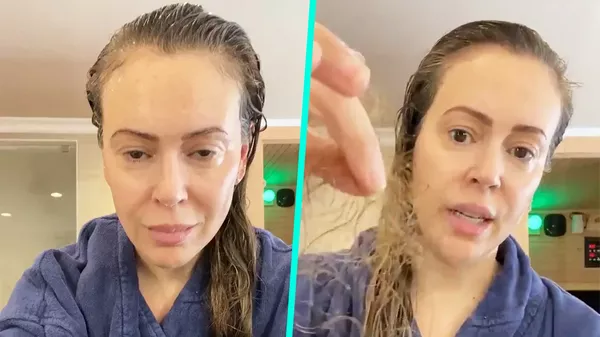From Root to Strand: Unveiling the Culprit Behind Hair Loss
A lush, voluminous mane is often associated with beauty and vitality, making hair loss a distressing condition for many. While there can be several contributing factors, deficiencies in vital nutrients play a significant role in the health of our tresses. Understanding the underlying deficiencies causing hair loss is crucial for effective prevention and treatment. In this article, we delve into the world of hair loss and shed light on the key nutritional deficiencies that can lead to this common concern. Let’s unlock the secrets to maintaining a head full of strong, radiant locks!
The Nutrient Puzzle
Our hair is a reflection of our overall health, and when it starts thinning or falling out, it’s often a sign that something is amiss within our bodies. While there are various reasons for hair loss, nutritional deficiencies can significantly impact the growth and strength of our locks. Several key nutrients, including vitamins, minerals, and proteins, are essential for maintaining healthy hair. Let’s explore the specific deficiencies that may be at the root of your hair loss woes.
Protein: The Building Block of Hair
Proteins are the backbone of our hair, literally. Our hair strands are composed of a protein called keratin, which provides strength and structure. Insufficient protein intake can lead to weak and brittle hair, ultimately causing hair loss. Incorporating protein-rich foods like lean meats, fish, eggs, legumes, and nuts into your diet is vital for maintaining healthy hair. Additionally, including sources of essential amino acids, such as lysine and methionine, can promote hair growth and prevent thinning.
Iron: Fueling the Follicles
Iron deficiency, known as anemia, is a common cause of hair loss. Iron plays a crucial role in carrying oxygen to the hair follicles, promoting hair growth and preventing shedding. When iron levels are depleted, the hair follicles receive less oxygen and essential nutrients, resulting in weakened hair and increased shedding. Incorporating iron-rich foods like red meat, spinach, lentils, and fortified cereals can help combat this deficiency. Pairing iron-rich foods with vitamin C sources, such as citrus fruits or bell peppers, enhances iron absorption.
Vitamin D: Shedding Light on Hair Loss
Vitamin D, also known as the sunshine vitamin, is essential for hair follicle function. It helps stimulate new hair growth and maintains the thickness of existing strands. Research has shown a significant correlation between vitamin D deficiency and hair loss. Limited exposure to sunlight, especially for those living in colder climates or with darker skin, can contribute to lower vitamin D levels. Including vitamin D-rich foods like fatty fish, fortified dairy products, and mushrooms, or considering supplements, can help ensure optimal levels for healthy hair growth.
B Vitamins: Energizing Hair Follicles
B vitamins, particularly biotin (B7), niacin (B3), and cobalamin (B12), play a vital role in maintaining healthy hair. Biotin deficiency, though rare, can lead to hair loss and brittle strands. Niacin promotes blood circulation to the scalp, while cobalamin aids in the production of red blood cells, ensuring adequate oxygen supply to hair follicles. Consuming foods such as eggs, whole grains, leafy greens, and dairy products can help replenish these essential B vitamins, promoting vibrant hair growth.
Zinc: Guarding Against Hair Loss
Zinc is a trace mineral that plays a crucial role in numerous bodily functions, including hair growth. It helps the oil glands in the scalp function properly, keeping the hair follicles moisturized and preventing dryness and breakage. Zinc deficiency has been associated with hair loss and thinning. Including zinc-rich foods like oysters, beef, pumpkin seeds, and legumes in your diet can help prevent this deficiency and support healthy hair growth.
Omega-3 Fatty Acids: Nourishing from Within
Omega-3 fatty acids, particularly EPA and DHA, are essential for overall health, including the health of our hair. These fatty acids help reduce inflammation, promote scalp health, and nourish the hair follicles. Inadequate intake of omega-3 fatty acids can lead to dry scalp, dull hair, and increased hair shedding. Fatty fish like salmon, sardines, and mackerel, as well as walnuts, flaxseeds, and chia seeds, are excellent sources of these beneficial fats. Including them in your diet can provide the necessary nourishment for healthy, resilient hair.
Vitamin E: Protecting Against Oxidative Stress
Vitamin E is an antioxidant that protects the cells from oxidative stress caused by free radicals. It also promotes blood circulation, ensuring the delivery of oxygen and nutrients to the hair follicles. Insufficient levels of vitamin E can lead to weakened hair follicles and increased hair loss. Including vitamin E-rich foods like almonds, sunflower seeds, spinach, and avocados can help maintain adequate levels of this essential nutrient and support healthy hair growth.
Addressing Deficiencies for Healthy Hair
If you suspect that nutritional deficiencies are contributing to your hair loss, it’s crucial to consult with a healthcare professional for a comprehensive evaluation. They can conduct blood tests to determine your nutrient levels and recommend appropriate interventions. In some cases, supplements may be prescribed to address specific deficiencies.
However, it’s important to note that while nutritional deficiencies can contribute to hair loss, they are not the sole cause. Other factors such as genetics, hormonal imbalances, stress, and certain medical conditions can also play a role. Therefore, a holistic approach that includes a balanced diet, proper hair care, stress management, and overall wellness is essential for maintaining healthy hair.
Conclusion
Hair loss can be a distressing experience, but understanding the role of nutritional deficiencies can empower individuals to take proactive steps towards healthy hair. Protein, iron, vitamin D, B vitamins, zinc, omega-3 fatty acids, and vitamin E all play vital roles in maintaining strong, vibrant locks. By incorporating nutrient-rich foods and addressing any deficiencies through supplementation under professional guidance, individuals can optimize their hair health. Remember, healthy hair starts from within, and nourishing your body with the right nutrients is key to unlocking a crown of luscious locks.

